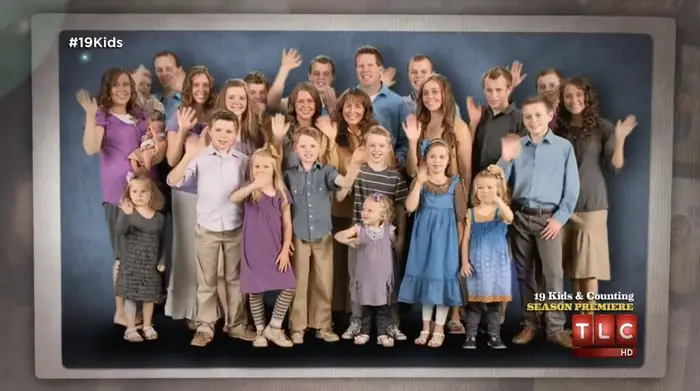AnalysisMallory Challis | June 7, 2023
The fame, scandal and drama surrounding the Duggar family has been a hot topic for Americans following their fundamentalist lifestyle.
The family adheres to a Quiverfull theology, which teaches that large families are a blessing from the Lord, as found in Psalm 127:3-5. The verse compares children to arrows and their families to a quiver (the container an archer uses to hold arrows). Like an archer who has many arrows in the quiver, parents who have many children in their family should be happy.
This is why the parents of this reality TV family — Jim Bob and Michelle Duggar — have so many children. According to the new documentary series Shiny Happy People, which released June 2 on Amazon Prime, their decision to enter the Quiverfull movement was partially influenced by a difficult miscarriage experienced by Michelle while she was taking birth control, which led her to stop taking the pill.

The Duggars also are known for their uber-fundamentalist lifestyle. Their TLC show, 19 Kids and Counting, depicts the family going to great lengths to ensure they lead a modest lifestyle in the ways they dress, act and court romantic partners. In this model of living, all the children are homeschooled and strict gender roles are enforced for both girls and boys.
The documentary series details the experiences of some in the family, especially Jill Duggar, and investigates how their upbringing was informed by the Institute in Basic Life Principles and the Advanced Training Institute, organizations founded on the teachings of Bill Gothard.
Gothard, who was highly influential in Southern Baptist churches nationwide in the 1970s and ’80s, was known for teaching strict gender roles for men and women, rebellion against parents as the “basic youth conflict” and even the dangers of rock and roll music because of its inherently immoral beat.
Bill Gothard
Gothard later was discredited for his own allegedly abusive behavior toward women and staff members.
According to a statement from Jim Bob and Michelle, Shiny Happy People is not an accurate depiction of their lifestyle. They explained, “This ‘documentary’ paints so much and so many in a derogatory and sensationalized way because sadly that’s the direction of entertainment these days.”
However, despite their public rejection of the documentary, it has gone viral. In fact, many Christians are finding connections between the questionable teachings shown in the documentary and their own lives.
As told in the four-episode series, it was difficult for survivors to come out about the abuse they experienced due to heavily authoritative teachings on power and submission promoted by IBLP and ATI. These teachings protected perpetrators of violence by allowing them to maintain authority over their victims while offering little to no outlets for victims to tell others what was going on.
For example, ATI Wisdom Booklet 36 — cited in the documentary series — says if a woman is sexually assaulted but does not “cry out” during the attack, she is responsible for the crime. This is because her scream could have “changed the outcome of an attack,” so her inability to scream is perceived as complicity in the crime, or an unwillingness to save herself.
“God has established some very strict guidelines of responsibility for a woman who is attacked. She is to cry out for help.”
The booklet specifically teaches, “God has established some very strict guidelines of responsibility for a woman who is attacked. She is to cry out for help. The victim who fails to do this is equally guilty with the attacker.”
The documentary series adjacently discusses how the clothes women wear is important, for both worship and daily life, including the ways women wear their hair. According to a clip from the show 19 Kids and Counting included in the series, Duggar boys were asked to look away from promiscuously dressed women while in public, as to avoid the possibility of experiencing sexual temptation. The family used the code word “Nike” to signal the presence of the woman to the entire group.
Gossip, according to former IBLP members interviewed for the expose, also was considered a “very serious sin,” and there were allegedly rules against gossiping for active members. These rules prevented victims of sexual violence from coming forward about their experiences, as talking about such things was socially and spiritually unacceptable.
Accusing an authority figure of sexual violence was not considered a report of dangerous misconduct, but a sinful action on the part of the accuser. This is because, even though the accuser most likely did experience sexual violence, these accusations threaten the status and authority of the figure being accused and are thus an expression of insubordination.
The documentary also discusses the financial gain Gothard received from IBLP and ATI, alleging the Gothard family lived a lavish lifestyle using profits from the organizations. Ex-IBLP members also claimed that during their childhood, many minors were required to engage in long hours of labor on behalf of the institution without proper compensation.
According to public tax filings analyzed in a report by Shannon Cuthrell at Ministry Watch, the institution has lost “tens of millions of dollars” since Gothard retired from ministry in 2014 after investigations of sexual misconduct.
On June 4, the official Facts About Kanakuk Twitter account posted a tweet discussing the exposure of Bill Gothard’s sexual misconduct in the documentary series. According to the tweet, abuse survivors from Kanakuk Kamps had similar experiences and found many parallels between the series and their lives.
The Facts About Kanakuk website says Joe White, president of Kanakuk Kamps, credits Bill Gothard as a “significant figure” who contributed to the success he has had in his life, work and ministry.
Joe White, president of Kanakuk Kamps, credits Bill Gothard as a “significant figure” who contributed to the success he has had in his life, work and ministry.
Although on the surface, Gothard’s organizations may seem fundamentalist compared to Kanakuk’s popular, mainstream ministry, the theological and authoritative teachings embedded in the two organizations are similar.
For example, students at Kanakuk are not required to dress in hyper-modest clothing or use code words to avoid sexual temptation. However, victims of sexual misconduct, molestation or violence and their families often were asked to emphasize forgiveness as an important Christian virtue. Subsequently, the organization has historically protected perpetrators of violence by failing to report their misconduct to authorities despite knowing violence was occurring.
Like Gothard’s rule on crying out during assault, these methods of institutional authority place responsibility on the victims of crimes to resolve the issues, not on the perpetrators, nor the institutions themselves. And much like Gothard’s rule on gossiping, victims who did come forward about their abuse in the civil court were often asked to sign non-disclosure agreements to avoid defaming the organization or its figures of authority.
More of Gothard’s teachings, according to the growing crowd of people who are watching and reacting to the documentary series, are present in mainstream circles of Christianity. Although they may not have been distributed in Wisdom Booklets, the sentiments taught by Gothard appear to have circulated around and trickled throughout many sects of Christianity, extending far beyond extreme fundamentalism.
Later, Gothard adapted his image to a less-violent depiction called The Umbrella of Protection.
One of the most popular of these teachings is Gothard’s “Umbrella of Protection” for family relationships. This graphic device places Christ at the top, represented by a large umbrella, then husbands directly under Christ with a slightly smaller umbrella. Husbands are charged with protecting and providing for their families. Under husbands are their wives, who are charged with the responsibilities of managing children and their household.
Although not pictured in the umbrella diagram, Gothard places his own authority between the husband and Christ. And because his authority was represented within the institutional understanding of family systems, this hierarchy allowed him to have direct control and influence over families.
This umbrella reinforces gender roles by demonstrating how men are perceived as closer in proximity to God in comparison to women and children and has been used throughout mainstream Christianity to forward arguments against the authority of women, including the roles of women in ministry.
Beth Moore, in a series of tweets responding to the documentary series, explains she never attended Gothard’s seminars or read his materials growing up but “constantly ran in circles that did.” She learned many teachings Gothard promoted without ever knowing they were created by him, including the Umbrella of Protection. Moore writes that her involvement in these circles often elicited shame, as she felt she was “already disqualified” amid the shiny happy people surrounding her who seemed super-righteous, and never engaged in sinful behavior.
Shiny Happy People and its virality certainly has caught the attention of the public. After learning more about the injustices that are infiltrating mainstream churches, what’s next for Christians today?
Many on Twitter, such as Rachael Denhollander, believe the documentary series is something all Christians should watch to be more educated and aware of problems that may be going on within our own institutions. Hopefully, the series’ exposure of abuse will encourage Christian institutions to look deeper at their own theological and authoritative systems and consider how they might do better in the future.
Overall, much like other instances of abuse and injustice, allowing victims and survivors to speak freely about their experiences is the most freeing act of all.
Chad Harris, ex-IBLP member featured in the documentary series, concludes the power falls in the hands of the victims, not the perpetrators: “It turns out as much as they try to control us, we were ultimately what they most feared and all we had to do was talk.”
Mallory Challis is a recent graduate of Wingate University and is a former BNG Clemons Fellow. She is working this summer as an intern at Providence Baptist Church in Charlotte, N.C., and will begin master of divinity studies at Wake Forest University School of Divinity this fall.
Related articles:
I survived the Christian fundamentalist world that created Josh Duggar | Opinion by Lydia Joy Launderville
The weakness of complementarian theology on display in Duggar trial | Opinion by Rick Pidcock
The seeds of evangelical angst over gender and sex were sown decades ago
Lawsuit accuses once-admired evangelical family expert of sexual abuse
News
Opinion
News
News
NewsMark Wingfield
OpinionJulia Goldie Day
NewsJeff Brumley
OpinionBarry Howard
AnalysisRick Pidcock
OpinionWendell Griffen
OpinionMallory Challis
NewsMarv Knox
OpinionAngela Yarber
NewsAudrey Simango
OpinionRodney Kennedy
OpinionDavid Gushee, Senior Columnist
NewsMark Wingfield
NewsSteve Rabey
NewsMaina Mwaura
NewsJeff Brumley
NewsMarv Knox
OpinionGreg Garrett, Senior Columnist
OpinionCarol McEntyre
NewsMark Wingfield
NewsMark Wingfield
NewsKristen Thomason
NewsJeff Brumley
NewsMarv Knox
NewsMarv Knox
NewsBarbara Francis
NewsJeff Brumley
NewsMarv Knox
NewsAudrey Simango
NewsMark Wingfield
NewsSteve Rabey
NewsMaina Mwaura
NewsJeff Brumley
NewsMarv Knox
NewsMark Wingfield
NewsMark Wingfield
NewsKristen Thomason
NewsJeff Brumley
NewsMarv Knox
NewsMarv Knox
NewsBarbara Francis
NewsJeff Brumley
NewsMark Wingfield
NewsMarv Knox
NewsMark Wingfield
NewsMark Wingfield
NewsJeff Brumley
NewsMallory Challis
NewsMark Wingfield
NewsJeff Brumley
NewsMark Wingfield
OpinionJulia Goldie Day
OpinionBarry Howard
OpinionWendell Griffen
OpinionMallory Challis
OpinionAngela Yarber
OpinionRodney Kennedy
OpinionDavid Gushee, Senior Columnist
OpinionGreg Garrett, Senior Columnist
OpinionCarol McEntyre
OpinionCharles Qualls
OpinionHannah Coe
OpinionArthur Wright Jr.
OpinionDave Roberts
OpinionBrandan Robertson
OpinionScott Collins
OpinionGlen Money
OpinionBarry Howard
OpinionLindsay Bruehl
OpinionBrandon Flanery
OpinionMalcolm Yarnell
OpinionDavid Jordan
OpinionGarrett Vickrey
OpinionH. Stephen Shoemaker
OpinionBill Leonard, Senior Columnist
OpinionJoe Marlow
Curated
Exclude from home pageBNG staff
Curated
Exclude from home pageBNG staff
Curated
Exclude from home pageBNG staff
Curated
Exclude from home pageBNG staff
Curated
Exclude from home pageBNG staff
Curated
Exclude from home pageBNG staff
Curated
Exclude from home pageBNG staff
Curated
Exclude from home pageBNG staff
Curated
Exclude from home pageBNG staff
Curated
Exclude from home pageBNG staff
Curated
Exclude from home pageBNG staff
Curated
Exclude from home pageBNG staff
Curated
Exclude from home pageBNG staff
Curated
Exclude from home pageBNG staff
Curated
Exclude from home pageBNG staff
Curated
Exclude from home pageFelicia Caid Smith
Curated
Exclude from home pageBNG staff
Curated
Exclude from home pageBNG staff
Curated
Exclude from home pageBNG staff
Curated
Exclude from home pageBNG staff
Curated
Exclude from home pageBNG staff
Curated
Exclude from home pageBNG staff
Curated
Exclude from home pageBNG staff
Curated
Exclude from home pageBNG staff
Curated
Exclude from home pageBNG staff

© 2023 Baptist News Global. All rights reserved.
Want to share a story? We hope you will! Read our republishing, terms of use and privacy policies here.
source















Post comments (0)